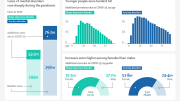
Research uses data from the Canadian Longitudinal Study on Aging (CLSA).
The COVID-19 pandemic has had a significant impact on the mental health of older people living in the community, with those who are lonely faring far worse, according to new research from McMaster University.
Using data from the Canadian Longitudinal Study on Aging (CLSA), a national team of researchers found that 43% of adults aged 50 or older experienced moderate or high levels of depressive symptoms at the beginning of the COVID-19 pandemic, and that increased over time.
Loneliness was the most significant predictor of worsening depressive symptoms, with other pandemic-related stressors, such as family conflict, also increasing the odds.
The study was published in the journal Nature Aging on November 25, 2021.

Parminder Raina, a professor in the Department of Health Research Methods, Evidence, and Impact and scientific director of the McMaster Institute for Research on Aging. Credit: McMaster University
The research was led by Parminder Raina, a professor in the Department of Health Research Methods, Evidence, and Impact and scientific director of the McMaster Institute for Research on Aging.
“The COVID-19 pandemic has had a disproportionated impact on older adults, with groups of people who were already marginalized feeling a far greater negative impact,” said Raina, lead principal investigator of the CLSA.
“Those who were socially isolated, experiencing poorer health and of lower socioeconomic status were more likely to have worsening depression as compared to their pre-pandemic depression status collected as part of the Canadian Longitudinal Study on Aging since 2011.”
The research team included CLSA principal investigators Christina Wolfson of McGill University, Susan Kirkland of Dalhousie University, Lauren Griffith of McMaster, along with a national team of investigators.
They used telephone and web survey data to examine how health-related factors and social determinants such as income and social participation, impacted the prevalence of depressive symptoms during the initial lockdown starting March 2020 and after re-opening following the first wave of COVID-19 in Canada.
Caregiving responsibilities, separation from family, family conflict, and loneliness were associated with a greater likelihood of moderate or high levels of depressive symptoms that got worse over time.
Women were also more likely to have higher odds of depressive symptoms during the pandemic compared to men, and a greater number of women reported separation from family, increased time caregiving as well as barriers to caregiving.
Overall, older adults had twice the odds of depressive symptoms during the pandemic compared to pre-pandemic. But those with lower income and poorer health, either due to pre-existing health conditions or health concerns reported during the pandemic, experienced a greater impact.
“These findings suggest the negative mental health impacts of the pandemic persist and may worsen over time and underscores the need for tailored interventions to address pandemic stressors and alleviate their impact on the mental health of older adults,” Raina added.
The findings mark the first published COVID-19 research emerging from the CLSA, a national research platform on aging involving more than 50,000 community-dwelling middle-aged and older adults at recruitment. The platform is funded by the Government of Canada through and Canadian Institutes of Health Research and the Canada Foundation for Innovation.
Reference: “A longitudinal analysis of the impact of the COVID-19 pandemic on the mental health of middle-aged and older adults from the Canadian Longitudinal Study on Aging” by Parminder Raina, Christina Wolfson, Lauren Griffith, Susan Kirkland, Jacqueline McMillan, Nicole Basta, Divya Joshi, Urun Erbas Oz, Nazmul Sohel, Geva Maimon, Mary Thompson and CLSA team, 25 November 2021, Nature Aging.
DOI: 10.1038/s43587-021-00128-1
Additional funding for the CLSA COVID-19 Questionnaire Study was provided by the Juravinski Research Institute, McMaster University, the McMaster Institute for Research on Aging, the Nova Scotia COVID-19 Health Research Coalition, and the Public Health Agency of Canada.








MSM is trying to make fun of people wanting to protect themselves with cheap and proven drugs. Ivermectin has been FDA approved for human use since 1996. It also beats Pfizer’s new wonder drug hands down, and costs next to nothing. Ivermectin doesn’t make tons of money. So they know the Covid shot is on its final gasp, so they take it add something different to it, rebrand under another name and charge 20 times what they would for ivermectin. I cannot wrap my head around this nonsense. When I explain this to my relatives they label me as crazy and ask me if I know better than science. I don’t make up these information out of my ass. All this information is true and proven. For some people it is near impossible for them to wake up. They are comfortable in their clown world life. If you want to get Ivermectin you can visit ivmpharmacy.com